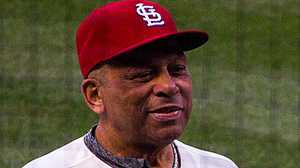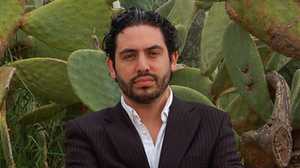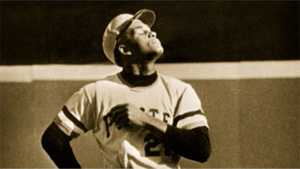Clemente's Family and Legacy
From the Collection: The U.S. Latino Experience
The youngest of seven children, Roberto Clemente grew up in a tight-knit, humble, but proud Puerto Rican family. His tragic death left behind his wife, Vera, three young sons, Roberto Jr., Luis Roberto, and Roberto Enrique — and a humanitarian reputation that lives on.
Many organizations honor Clemente’s spirit of caring. Major League Baseball gives the Roberto Clemente Award to current players who exemplify Clemente’s commitment to community and helping others. The Bard College Clemente Course in the Humanities offers free college courses to thousands of economically and educationally disadvantaged people in American cities. In Puerto Rico, Clemente’s family helps support a sports complex that teaches and inspires hundreds of thousands of youth annually, and in Pittsburgh, they founded the Roberto Clemente Foundation to help disadvantaged youth.
Here, Clemente family members describe their famous relative and his legacy.
Clemente's Fame
The morning [he asked me on our first date], I was at my desk, and suddenly, he took me by surprise, and then I accepted the invitation. When I hanged up… I said, oh my god, just what have I done. I mean, I just had said yes. And then I felt worried. Then, at lunch day, I don’t know how people found out at the bank… they did not let me work that morning. At noon, they all just walked outside, everyone, auditors and all the executives. To try to take a look at him… I walked outside, on time. And we went for lunch.
— Vera Clemente, wife
Early on I caught on that wherever he went… people wanted his attention… it became something normal to me, because it was like that, day in, day out.
— Luis Clemente, son
They were moments of tranquility, lots of union, and peace. He avoided other commitments in order to spend time with his family. There’d be no baseball talk at the house, unless there’d be visitors who’d begin asking questions. He didn’t like to talk about baseball at the house.
— Vera Clemente, wife
I remember when dad connected the 3,000th hit, we were in school here, in Puerto Rico. And it was announced through the intercom system. So it was a big roar in the whole school… he was the first Hispanic to accomplish this task, the eleventh player in all of baseball history to do it. He had to have that 3,000… He won 12 Golden Gloves and everything else, but that 3,000th hit, only ten players before him had accomplished that in all of baseball history.
— Luis Clemente, son
Puerto Rico and the U.S.
We were born and raised here in Puerto Rico. And we had to go to school, everything else here in Puerto Rico. So for a certain time of the year we would not see him because he was playing out in the States.
— Luis Clemente, son
He had a lot of perseverance. He said everyone was equal. White, black, yellow, he believed everyone was equal. He helped a lot to do away with racism… when he was playing with the guys from Pittsburgh, his white teammates, he’d explain to them, “Look, everyone is equal, what you feel, the other feels, too, and what ails you, ails the other as well.” And the white teammates also helped to do away with that segregation of those times.
— Matino Clemente, brother
People tend to think that [Puerto Ricans are all] pretty much alike. We are not. Totally not. You know, we have totally different cultures… a mix of Spanish… Taino Indian from Puerto Rico, and Africans that were the slaves that were brought to the island. And so we don’t see colors. My grandmother from mom’s [Vera Clemente’s] end was black. Her husband Papito was white, Spanish descendant.
— Luis Clemente, son
Clemente's Legacy
I would like for people to see my father as an inspiration. To see him as a person who came from, you know, not a rich neighborhood or anything, but from a noble house in Puerto Rico. Probably with no hopes of knowing what he was going to become, but carrying himself in such a way that always had — you know, the values. That was always first. The caring and respect for the parents and siblings, and towards people. Zero tolerance against injustice. Not putting up with being put down. Becoming an activist and letting his message get across very strongly. That should be an inspiration to everyone… understanding how a single individual really truly makes a difference.
— Luis Clemente, son
He saw that you were having a hard time, and he would go out of his way to try and help you. He’d say, “If God gave me this gift, and he gave this to me when others don’t have anything, then I [should] reach out to help them.” He helped a lot of people. He had a [baseball] clinic here in Puerto Rico, for young kids. He’d give away gifts, on Three Kings Day. He felt good doing that. He felt really good reaching out to people.
— Matino Clemente, brother
When the earthquake took place [in Nicaragua], he felt a responsibility, as if he had lost relatives of his own. The campaign started on Christmas Day. Entire families were standing in line at the Hiram Bithorn Stadium, bringing unopened gifts, [bringing] a lot of help.
When he passed away, all the funds that were raised were used to build a pediatrics wing at the Masaya Hospital [in Nicaragua]. That expansion for a pediatrics department was built with those funds, with the collaboration of engineers over there, and we’d transfer funds to them… A lot of people from [Puerto Rico] went to that inauguration… The hospital was decorated, it had air conditioning, color TV, very pretty, pediatric, it was for children.
— Vera Clemente, wife








